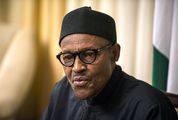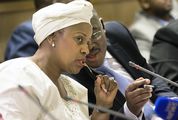Source:

BUSINESS DAY TV: Mediclinic sees Middle East as platform for growth
by Transcript service,
2015-11-13 13:32:16.0
DANIE Meintjes is CEO of Mediclinic
BUSINESS DAY TV: Growing demand globally for private healthcare is providing growth and new opportunities for Mediclinic. The private hospitals group has reported a 16% rise in normalised revenue for the six months to September. Normalised headline earnings per share up by 19%. This was in part due to a strong performance at Swiss clinics group Hirslanden and its global expansion continues with the proposed merger with Al Noor in the United Arab Emirates (UAE).
We’re joined on the line with more by CEO Danie Meintjies. Danie...so your first half results drawing much benefit from the weaker rand with your international exposure where those platforms being Switzerland, the UK and the Middle East, now contribute 66% of adjusted normalised headline earnings. Does this just entrench your global strategy more so?
Danie Meintjes: Yes...it’s correct as you’ve said, almost 70% of our revenue and EBITDA is generated abroad and where we have a weakening rand that obviously impacts positively on what we report here. But if we look at it in local currency, the businesses in Switzerland and Dubai performed very well and that is how we evaluate the performance of the businesses. And yes our recent investment in Spire with a 29.9% in a strong currency we believe spreading the risk and investing in strong currency territories makes sense.
BDTV: And yet your operations in SA still remain very profitable, in fact more so than those in Switzerland, so while you are expanding globally how much focus into growing your operations in Southern Africa?
DM: Yes we’re very positive still. The reality is that the economy is not really growing at a great rate and if we don’t have a growing economy, we don’t see the creation of formal employment and we depend on the growth in formal employment. The other reality is that we are one of the three big groups in SA and big mergers and acquisitions will not be possible and that is why strategically we focus on the bigger growth abroad. But SA performed very well and we still invest in SA...we recently opened a new hospital in the Midstream area, we built a new hospital in Kimberley, we’ve opened some new day clinics in SA, so we’re still positive but it will be limited growth in terms of greenfields going forward.
BDTV: So when it comes to the demand for private healthcare offerings what kind of market are you catering to, and is this across the board on a geographic basis or do distinctions need to be made?
DM: It’s a difficult one to give you an exact answer. We obviously evaluate properly to see where it makes sense to us, but we believe where there is a big developed economy there are certain benefits. We depend in all the territories on the insurance industry, so looking at territories where you haven’t got an established insurance industry really starting up is not our first preference at this stage. But we evaluate whatever that’s available makes sense for us for an investment.
BDTV: The United Arab Emirates is still pretty small when you compare it to the size of your operations in Switzerland and Southern Africa, how much of a game-changer though is Al Noor going to be if that deal does go ahead?
DM: Yes we’ve said that the Middle East is a growth platform, but at the moment it’s still the smallest of our platforms. If we conclude our Al Noor transaction that component will double and go, if I remember correctly, close to 22% -23% of our revenue. So we see it as important and maybe just one further comment...the Al Noor transaction at an operational level, the beauty for us is that it is very supplementary...complementary to our existing footprint. We are currently the number one operator in Dubai. They are the number one operator in Abu Dhabi with very little overlap and potential synergies when you combine the businesses.
BDTV: Of course you’re not the only one keen on Al Noor, you’ve got NMC Health also based in Abu Dhabi pursuing that operation. So how are things progressing as you see it, and do you see Mediclinic venturing into a bidding war if needs be?
DM: Yes...I can’t speculate on behalf of NMC. Our bid is on the table. Their board has approved it and so far our bid is the only official bid on the table as far as we know. We don’t want to speculate. We’ve got a certain process that we will provide and we will carry on and try to conclude the deal as soon as possible.
BDTV: How about the benefits of that London listing if that deal goes ahead and what that means for raising capital in the future because it will be much cheaper for you then?
DM: Yes, the London listing will be important. We see it as a benefit of this transaction. Growing abroad where you need strong currency...I can give you an example...the previous rights offer that we did in SA in rands when we acquired the deal with Spire, the rand can go up and down and if you do need to pay hard currency I believe it will make sense to have that there, but also it’s a bigger market and the availability of capital for further growth will be more positive on a London listing.
BDTV: You’ve seen capital investments being made over the period amounting to about R1.5bn in all three of your operating platforms. Moving forward where is that capital going to be put to work?
DM: That is our number one priority. We evaluate all projects very carefully. We know what the cost of capital is in the different territories that we weigh up, but I can also confirm that we’ve got a good policy and a good discipline in the Mediclinic post projects. We re-evaluate them and look at the assumptions and see whether we’ve made the targets that we have put for ourselves. So we put it at work to benefit the shareholders at the end of the day.
BDTV: Of course more geographies also means more regulators that you have to work with and regulatory hurdles in all of those geographies, I’m sure, but also can work to your benefit because they are pushing very fast for private healthcare in the UAE.
DM: In the UAE...the starting of the regulating environment is common, we’ve seen regulatory changes for the last 30 years in our industry, but in the UAE the government is very supportive of the private sector. They have the approach that the private sector looks after the bulk of the population, being the expats, and so far I can only say that we’ve had very good cooperation from the regulatory authorities in that country.
DANIE Meintjes is CEO of Mediclinic
BUSINESS DAY TV: Growing demand globally for private healthcare is providing growth and new opportunities for Mediclinic. The private hospitals group has reported a 16% rise in normalised revenue for the six months to September. Normalised headline earnings per share up by 19%. This was in part due to a strong performance at Swiss clinics group Hirslanden and its global expansion continues with the proposed merger with Al Noor in the United Arab Emirates (UAE).
We’re joined on the line with more by CEO Danie Meintjies. Danie...so your first half results drawing much benefit from the weaker rand with your international exposure where those platforms being Switzerland, the UK and the Middle East, now contribute 66% of adjusted normalised headline earnings. Does this just entrench your global strategy more so?
Danie Meintjes: Yes...it’s correct as you’ve said, almost 70% of our revenue and EBITDA is generated abroad and where we have a weakening rand that obviously impacts positively on what we report here. But if we look at it in local currency, the businesses in Switzerland and Dubai performed very well and that is how we evaluate the performance of the businesses. And yes our recent investment in Spire with a 29.9% in a strong currency we believe spreading the risk and investing in strong currency territories makes sense.
BDTV: And yet your operations in SA still remain very profitable, in fact more so than those in Switzerland, so while you are expanding globally how much focus into growing your operations in Southern Africa?
DM: Yes we’re very positive still. The reality is that the economy is not really growing at a great rate and if we don’t have a growing economy, we don’t see the creation of formal employment and we depend on the growth in formal employment. The other reality is that we are one of the three big groups in SA and big mergers and acquisitions will not be possible and that is why strategically we focus on the bigger growth abroad. But SA performed very well and we still invest in SA...we recently opened a new hospital in the Midstream area, we built a new hospital in Kimberley, we’ve opened some new day clinics in SA, so we’re still positive but it will be limited growth in terms of greenfields going forward.
BDTV: So when it comes to the demand for private healthcare offerings what kind of market are you catering to, and is this across the board on a geographic basis or do distinctions need to be made?
DM: It’s a difficult one to give you an exact answer. We obviously evaluate properly to see where it makes sense to us, but we believe where there is a big developed economy there are certain benefits. We depend in all the territories on the insurance industry, so looking at territories where you haven’t got an established insurance industry really starting up is not our first preference at this stage. But we evaluate whatever that’s available makes sense for us for an investment.
BDTV: The United Arab Emirates is still pretty small when you compare it to the size of your operations in Switzerland and Southern Africa, how much of a game-changer though is Al Noor going to be if that deal does go ahead?
DM: Yes we’ve said that the Middle East is a growth platform, but at the moment it’s still the smallest of our platforms. If we conclude our Al Noor transaction that component will double and go, if I remember correctly, close to 22% -23% of our revenue. So we see it as important and maybe just one further comment...the Al Noor transaction at an operational level, the beauty for us is that it is very supplementary...complementary to our existing footprint. We are currently the number one operator in Dubai. They are the number one operator in Abu Dhabi with very little overlap and potential synergies when you combine the businesses.
BDTV: Of course you’re not the only one keen on Al Noor, you’ve got NMC Health also based in Abu Dhabi pursuing that operation. So how are things progressing as you see it, and do you see Mediclinic venturing into a bidding war if needs be?
DM: Yes...I can’t speculate on behalf of NMC. Our bid is on the table. Their board has approved it and so far our bid is the only official bid on the table as far as we know. We don’t want to speculate. We’ve got a certain process that we will provide and we will carry on and try to conclude the deal as soon as possible.
BDTV: How about the benefits of that London listing if that deal goes ahead and what that means for raising capital in the future because it will be much cheaper for you then?
DM: Yes, the London listing will be important. We see it as a benefit of this transaction. Growing abroad where you need strong currency...I can give you an example...the previous rights offer that we did in SA in rands when we acquired the deal with Spire, the rand can go up and down and if you do need to pay hard currency I believe it will make sense to have that there, but also it’s a bigger market and the availability of capital for further growth will be more positive on a London listing.
BDTV: You’ve seen capital investments being made over the period amounting to about R1.5bn in all three of your operating platforms. Moving forward where is that capital going to be put to work?
DM: That is our number one priority. We evaluate all projects very carefully. We know what the cost of capital is in the different territories that we weigh up, but I can also confirm that we’ve got a good policy and a good discipline in the Mediclinic post projects. We re-evaluate them and look at the assumptions and see whether we’ve made the targets that we have put for ourselves. So we put it at work to benefit the shareholders at the end of the day.
BDTV: Of course more geographies also means more regulators that you have to work with and regulatory hurdles in all of those geographies, I’m sure, but also can work to your benefit because they are pushing very fast for private healthcare in the UAE.
DM: In the UAE...the starting of the regulating environment is common, we’ve seen regulatory changes for the last 30 years in our industry, but in the UAE the government is very supportive of the private sector. They have the approach that the private sector looks after the bulk of the population, being the expats, and so far I can only say that we’ve had very good cooperation from the regulatory authorities in that country.






















Login OR Join up TO COMMENT